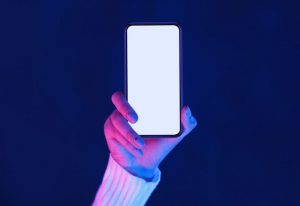For many people, taking their mobile phone to bed for a last bit of texting, email checking, social media scrolling, video watching or web-surfing before going to sleep is the norm. However, there is mounting evidence that using your cell phone before bed is actually harmful to your health in a variety of ways.
Studies have linked evening use of devices such as mobile phones, tablets and computers to delayed sleep timing, decreased sleep quality and circadian rhythm disruption. Those things – insufficient sleep, poor quality sleep and circadian rhythm disruption – are associated with higher risks of a variety of physical, mental and cognitive health problems.
How Using Your Cell Phone Before Bed Impacts Sleep

Timing matters, though, when it comes to light exposure and evening exposure to blue light can stimulate the brain, making you feel alert instead of drowsy. Blue light exposure can delay or suppress melatonin production. Produced and secreted by the brain’s pineal gland as evening light dims to the dark of night, melatonin is a hormone that, among its other important functions, promotes sleep. When bright light or blue light disrupts melatonin production, sleep timing is delayed, and sleep quality may suffer.
In addition to its impact on pineal gland function, nighttime cell phone usage may affect your brain in another way. According to one study, the 884 MHz mobile phone radiofrequency may impact the brain’s own highly sensitive electrical system, potentially increasing the amount of time it takes to reach the deep, restorative sleep phase and decreasing the amount of time spent in this critical sleep phase. Using a cell phone directly before you go to bed can also increase stress – think work emails, negative social media and the like – which isn’t good for you or your sleep.
What This Can Mean for Health
The impact of suppressing or delaying melatonin can reach far beyond sleep. Melatonin plays an important role in the regulating and functioning of the immune system and metabolism, including blood sugar management. It also acts as an antioxidant and anti-inflammatory agent. Thus, it should come as no surprise that disruptions in the production and release of melatonin are associated with a higher risk of developing a number of chronic health conditions and diseases, including obesity, cardiovascular diseases, type 2 diabetes and metabolic syndrome.
Another health-impacting aspect of melatonin is its influence on the circadian rhythm via the hormone’s role in sleep-wake timing. Sleep- and wake-timing influence the circadian rhythm, and the circadian rhythm helps regulate the sleep-wake cycle. In other words, the two are intricately entwined.
The circadian rhythm also helps to synchronize biological clocks throughout the body, thereby influencing the timing of countless essential bodily processes, including the activities of a single cell. Circadian rhythm disruption is also associated with a greater risk of poor health and disease, both physical and mental, including certain types of cancer, dementia and other types of cognitive decline.
Poor sleep quality can be bad for brain health. If you are not getting enough deep sleep, you are missing out on time spent in the restorative period of the sleep phases, when body growth, healing and systems maintenance takes place. It is during deep sleep that toxins are flushed out of the brain, including those associated with Alzheimer’s disease and dementia.
Reduce the Impact of Using Your Cell Phone Before Bed

Many mobile phones have blue light filters that you can use in the evening to limit your exposure to that melatonin-suppressing light. If your cell phone doesn’t come with it, you may be able to download an app for that. Set an alarm to remind you it is time to sleep to help you avoid losing track of time and depriving yourself of sleep by staying up too late.
Be more mindful about your bedtime cell phone use. Avoid doing things likely to increase your stress levels, like checking work email or involving yourself in contentious social media discussions. Relax your way into sleep with an audio book, setting your phone on the nightstand instead of holding it and looking at it.







